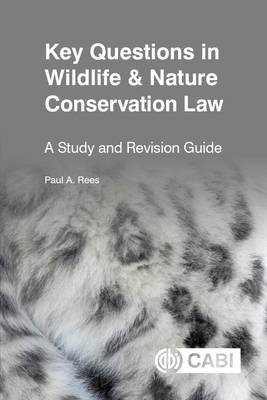
- Retrait gratuit dans votre magasin Club
- 7.000.000 titres dans notre catalogue
- Payer en toute sécurité
- Toujours un magasin près de chez vous
- Retrait gratuit dans votre magasin Club
- 7.000.0000 titres dans notre catalogue
- Payer en toute sécurité
- Toujours un magasin près de chez vous
74,95 €
+ 149 points
Description
Law plays an essential part in the conservation of wildlife and ecosystems. The study of wildlife and nature conservation law is an important component of a wide range of programmes of study including wildlife conservation, environmental management and environmental law.This book is a study and revision guide for students following such programmes. It contains 600 multiple choice questions (and answers) set at three levels - foundation, intermediate and advanced - and grouped into 10 major topic areas:1. Principles of Wildlife and Nature Conservation Law2. History of Wildlife and Nature Conservation Law3. Species Protection and Exploitation I - EU and International Law4. Species Protection and Exploitation II - National Laws5. Protected Areas and Habitats I - EU and International Laws6. Protected Areas and Habitats II - National Laws7. Planning, Pollution, Restoration and Conservation Funding8. Wildlife Trade, Animal Collections and Alien Species9. Wildlife Law Enforcement and Penalties10. Legal TextsThis book has been produced in a convenient format so that it can be used at any time, in any place. It allows the reader to learn and revise the meaning of terms used in wildlife and nature conservation law and study the role of legislation at national, European Union (EU) and international level in the protection of individual species, habitats and landscapes. It uses examples from a wide variety of taxa, habitats and protected areas selected from a range of jurisdictions from the United Kingdom, the United States and Australia to Antarctica and the High Seas. Topics include the control of hunting, the conservation of trees and forests, the protection of National Parks and wilderness areas, wildlife trade and the organisations involved in the enforcement of wildlife laws. The structure of the book allows the study of one topic area at a time, progressing through simple questions to those that are more demanding. Some of the questions require students to use their knowledge to interpret information provided in the form of photographs and legal texts.
Spécifications
Parties prenantes
- Auteur(s) :
- Editeur:
Contenu
- Nombre de pages :
- 268
- Langue:
- Anglais
- Collection :
Caractéristiques
- EAN:
- 9781800628328
- Date de parution :
- 09-07-24
- Format:
- Livre relié
- Format numérique:
- Genaaid
- Dimensions :
- 157 mm x 236 mm
- Poids :
- 680 g

Les avis
Nous publions uniquement les avis qui respectent les conditions requises. Consultez nos conditions pour les avis.






